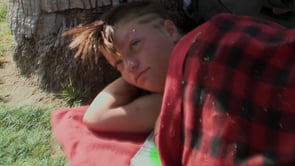By Lynn Venhaus
A playwright and theater director, Leoni staged “The Playground,” which was about unhoused youth. He talked to two homeless girls, who eventually wound up dead. As he learned more about the at-risk youngsters and their risky behavior, he wanted to help, and thought filming a 2-minute public service announcement would raise awareness. What happened instead changed his life.
By getting close to a group of street kids in Hollywood and Venice, Leoni earned their trust and heard their stories, which he filmed and has included in his stark and intense feature documentary, “American Street Kid.”
The numbers are overwhelming: 1.8 million kids are homeless; 5,000 die a year, which is 13 a day.
Leoni used guerrilla-style filmmaking, hand-held cameras, recordings of many phone calls and split screen editing for the 1-hour, 44-minute film. He also became part of the story, impacting lives and creating a transformational program.
There is little surprise as he captured their daily struggle of finding food, trying to get money, seeking a safe place to sleep. They are scared. They are crime victims. They prostitute themselves for survival.
Leoni quickly became involved as a caring friend, trying to help but realizing that he couldn’t fix all these broken lives. His frustration with the system becomes another aspect of the film.
He focuses on a few who have created a family on the streets, and these portraits are haunting and riveting, as we see the psychological damage of lost childhoods and unloved, neglected, troubled young adults who can’t seem to break the cycle. Some are addicts, some dream of better lives but do not have the mental and emotional tools to succeed. They can’t get past their pasts.
The tales of woe are gut-wrenching – beatings, sexual assaults, drug-addicted parents, stepdads who don’t want them around, their own issues with substance abuse – drugs are everywhere on the streets, and a way to numb their pain.
Their multiple problems can’t get the attention from the under-staffed and under-financed social services and non-profit groups. The shelters and the rescue missions are full.
Ryan, whose father thought he was worthless, has just wanted a home and family. His girlfriend Nessa is pregnant, but she was also diagnosed with HIV. He uses meth. Ishmael, an aspiring musician, said he is the son of a pimp and a prostitute who abandoned him. Nick left home at 15. A girl said she didn’t know what rape was but went into the school nurse bleeding. She was immediately taken away to foster care..
The film is rough to watch. Hopelessness pervades the film, even though Leoni tries – he is their confidante, their advisor. He tries to find places for them. He counsels them to go into rehab. He looks for programs that can better their lives. He never gives up on them.
Stacia Fiore, an outreach counselor, warns Leoni about getting too close. But she is impressed with his advocacy and is a sounding board.
There are glimmers of hope and a few success stories, which drives the film.
However, the biggest success came after the movie – for Marquesha Babers, known as “Kiki.” She was 15 when the filmmakers first met her. Her poetry has gone on to inspire women around the world. She has performed “That Girl” in London and for such luminaries as Angelina Jolie, Hillary Clinton and Freida Pinto. The poem is included on a collaboration album, “6 Feat,” a collection of poems turned into songs with social justice as the theme.
The film, several years in the making and completed in 2018, is produced by Kandoo Films, a Los Angeles-based production company run by Howard Barish, who produced “13th” and “Middle of Nowhere.”
Inspired by figuring out it’s the transformation, not just transition, that is needed, Leoni founded the organization Spare Some Change. He created and launched a media campaign/artistic mentoring program that exposes street youth to the arts and motivates them to create change in their lives. www.sparesomechangethemovement.com.
The movie has a lot to carry on its shoulders but its heart is definitely in the right place.
“American Street Kid” is a documentary written and directed by Michael Leoni. It’s not rated, but there is pervasive drug use and language throughout. The runtime is 1 hour, 44 minutes. Lynn’s Grade: B. The movie is available video on demand through digital and cable platforms as of Aug. 21.

Lynn (Zipfel) Venhaus has had a continuous byline in St. Louis metro region publications since 1978. She writes features and news for Belleville News-Democrat and contributes to St. Louis magazine and other publications.
She is a Rotten Tomatoes-approved film critic, currently reviews films for Webster-Kirkwood Times and KTRS Radio, covers entertainment for PopLifeSTL.com and co-hosts podcast PopLifeSTL.com…Presents.
She is a member of Critics Choice Association, where she serves on the women’s and marketing committees; Alliance of Women Film Journalists; and on the board of the St. Louis Film Critics Association. She is a founding and board member of the St. Louis Theater Circle.
She is retired from teaching journalism/media as an adjunct college instructor.

